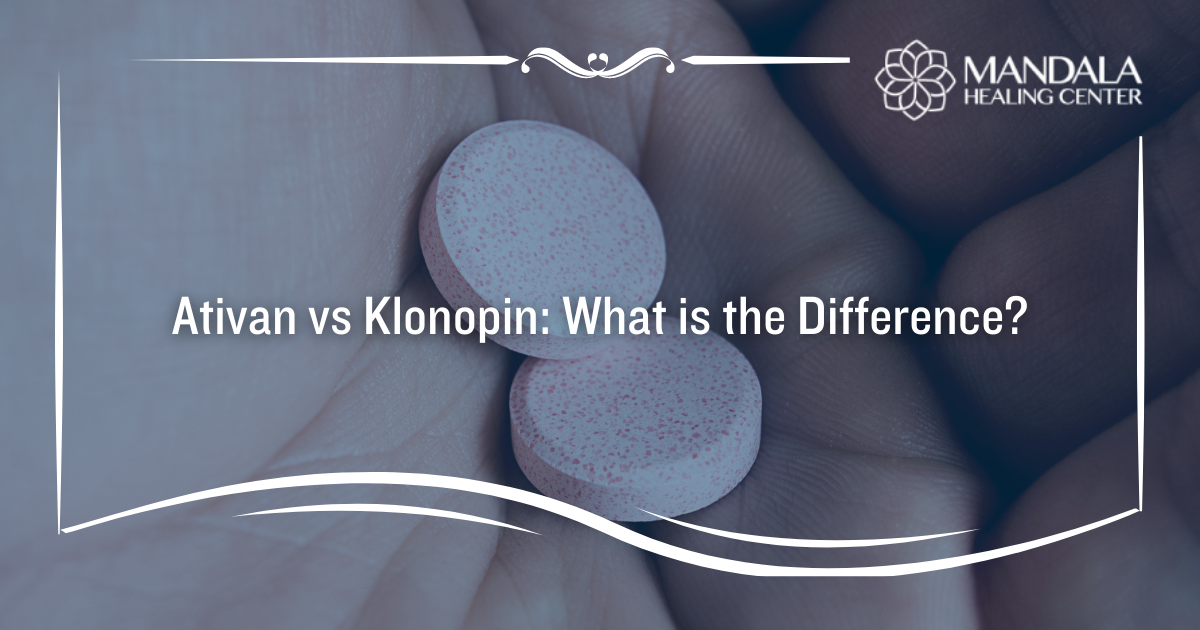Benzodiazepines are a class of drugs used to treat anxiety and seizure disorders. While these substances are effective in curbing anxiety and preventing seizures, they are also habit-forming and extremely addictive. With that being said, several different types of benzodiazepines are notoriously abused.
According to the National Institute of Drug Abuse, 5.2 million Americans misused benzodiazepines in the past year.[1]
Two of the most commonly abused benzodiazepines are known as Ativan (lorazepam) and Klonopin (clonazepam). While these medications are generally used to treat the same conditions, there are some distinct differences between the two.
What is Ativan (Lorazepam)?
Ativan is a benzodiazepine used to treat a variety of conditions. Some of these conditions include anxiety disorders, insomnia, sleep issues due to stress, and status epilepticus (continuous seizures). Additionally, lorazepam may be used as a pre-anesthesia medication.
Common side effects of lorazepam include:[2]
- Dizziness
- Drowsiness
- Feeling lightheaded
- Impaired coordination
- Decreased ability to concentrate
- Fatigue
- Nausea
- Changes in appetite
- Restlessness or excitement
- Blurred vision
This medication is only intended to be used for short periods, as long-term use of Ativan could lead to dependency and addiction. People who abuse Ativan may begin to increase their dosage without speaking to their doctor to experience a more potent effect. Unfortunately, this can cause someone to take more of the substance than their body can handle, leading to a life-threatening overdose.
If you suspect that your loved one is abusing lorazepam, consider getting them into a drug rehab program to prevent them from experiencing the fatal consequences of benzodiazepine addiction, like overdose and long-term damage to the body.
What is Klonopin (Clonazepam)?
Klonopin is similar to Ativan because both substances are benzodiazepines that are used to treat anxiety, sleep, and seizure disorders. However, clonazepam is not used as a pre-anesthesia medication like lorazepam. Klonopin is most commonly used to treat panic disorder, a condition where people have frequent panic attacks that limit their ability to function in their daily lives.
Common side effects of Klonopin include:[3]
- drowsiness
- dizziness
- unsteadiness
- problems with coordination
- difficulty thinking or remembering
- increased saliva
- muscle or joint pain
- frequent urination
- blurred vision
- changes in sex drive or ability
According to the National Alliance on Mental Illness, “Benzodiazepines, such as clonazepam, are often used for short periods only. They may produce emotional and/or physical dependence (addiction) even when used as recommended.”[4]
Using Klonopin in any way other than as directed by a doctor is likely to result in addiction. Long-term Klonopin abuse and addiction can significantly affect your life, leading to the development of health conditions, worsening symptoms of mental illness, and life-threatening emergencies like overdoses.
Differences Between Ativan and Klonopin
Because Ativan and Klonopin are benzodiazepines, they are both central nervous system (CNS) depressants that work by slowing down activity in your brain. Additionally, these medications tend to be prescribed to treat the same conditions. However, there are some differences to be aware of.
The differences between clonazepam and lorazepam include:
- While both substances can treat the same conditions, it is more common for Klonopin to be prescribed for seizures, while Ativan is prescribed for anxiety disorders.
- These medications are structurally different, with Ativan having a chloride group and Klonopin having a nitro group.
- Ativan can be taken as a pill or an injection, while Klonopin is only available via tablet
- Klonopin is long-acting while Ativan is an intermediate-acting benzodiazepine
- Ativan has a half-life of 25 hours while Klonopin has a long half-life of 40 hours
- While both medications have a high potential for abuse, tolerance builds faster among people taking Ativan
It is important to note that everyone responds differently to medications. If you are suffering from anxiety, sleep, or seizure disorders, one of these substances might work better for you than the other.
Dangers of Benzodiazepine Abuse
Benzodiazepine abuse almost always leads to a full-blown addiction because you can build a tolerance to these substances extremely fast. As your tolerance builds, you will have to continually increase your dosage to experience the desired effect.
When you are increasing your dosage of benzodiazepines, there is a significant risk of experiencing an overdose. This is one of the most concerning dangers of benzodiazepine abuse, as overdoses can occur even during your first time abusing the substance.
Symptoms of a benzodiazepine overdose include:[5]
- Drowsiness
- Extreme fatigue
- Slowed or stopped breathing
- Inability to breathe
- Blue tint to lips and fingertips
- Confusion
- Disorientation
- Dizziness
- Double vision or blurred vision
- Weakness
- Loss of muscle coordination
- Slurred speech
- Altered mental state
- Hallucinations
- Stupor
- Coma
In addition to life-threatening overdoses, once you are addicted to a benzodiazepine your brain and body become accustomed to the presence of the substance. If you attempt to abruptly stop using the drug, you will experience severe symptoms of withdrawal. Without medical attention, benzodiazepine withdrawal can result in a fatal seizure.
If you or a loved one abuses a benzodiazepine drug like Ativan or Klonopin, attending a benzodiazepine addiction treatment program is of the utmost importance.
Getting Help for Ativan or Klonopin Addiction
At the Mandala Healing Center, we are sensitive to the fact that every person we treat comes from a different background and has a unique set of needs. Our wide array of addiction treatment offerings allows us to cater to each patient’s strengths, and find the programs and activities that work best on an individual level. Our evidenced-based programs and holistic methods are designed to keep patients engaged in treatment, develop the necessary life strategies and skills to sustain long-term sobriety, and achieve optimal health and internal balance.
To learn more about our South Florida addiction treatment programs, contact Mandala Healing Center today.
References:
- https://nida.nih.gov/news-events/science-highlight/research-suggests-benzodiazepine-use-high-while-use-disorder-rates-are-low
- https://medlineplus.gov/druginfo/meds/a682053.html
- https://medlineplus.gov/druginfo/meds/a682279.html
- https://www.nami.org/About-Mental-Illness/Treatments/Mental-Health-Medications/Types-of-Medication/Clonazepam-(Klonopin)
- https://www.ncbi.nlm.nih.gov/books/NBK482238/












